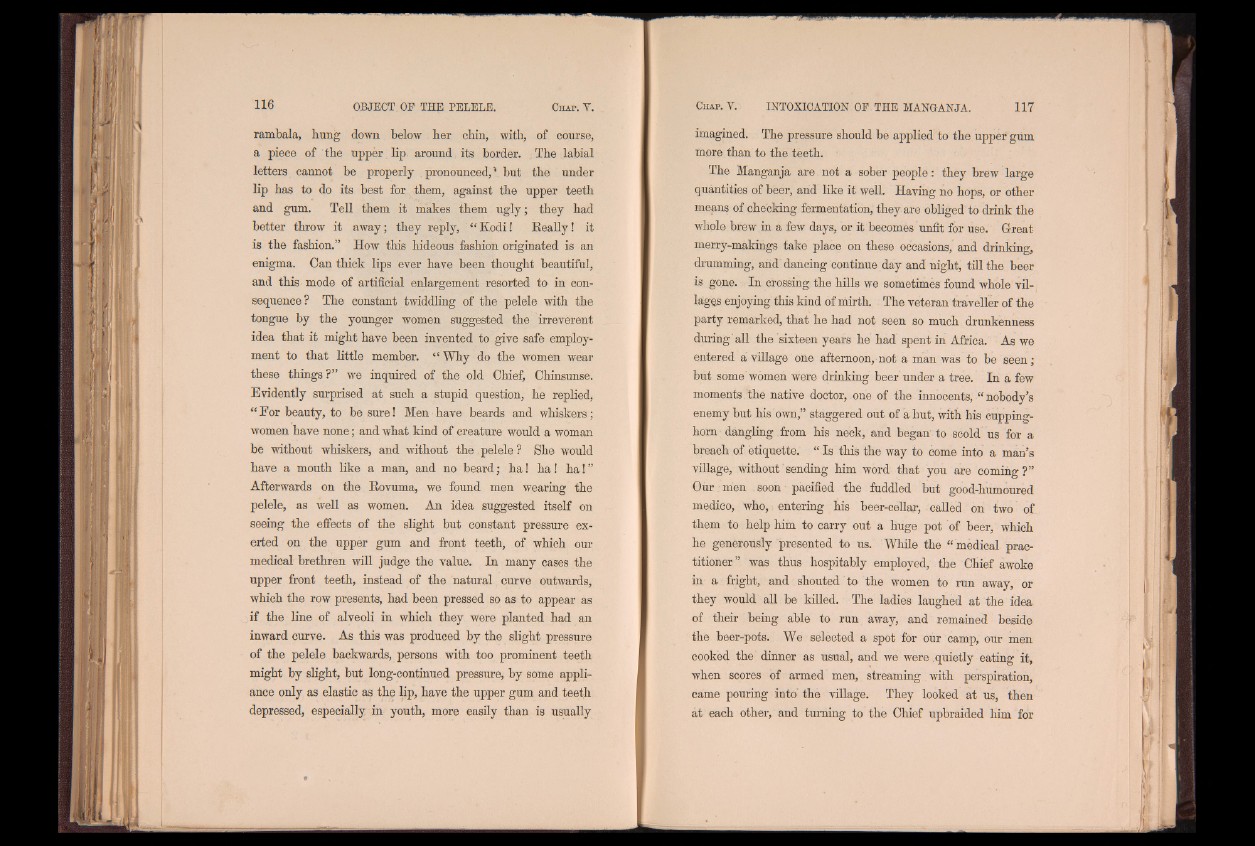
rambala, hung down below her chin, with, of course,
a piece of the upper lip. around its border. The labial
letters cannot be properly pronounced, 11 but the under
lip has to do its best for them, against the upper teeth
and gum. Tell them it makes them ugly; they had
better throw it away; they reply, I Kodi! Really! it
is the fashion.” How this hideous fashion originated is an
enigma. Can thick lips ever have been thought beautiful,
and this mode of artificial enlargement resorted to in consequence?
The constant twiddling of the pelele with the
tongue by the younger women suggested the irreverent
idea that it might have been invented to give safe employment
to that little member. “ Why do the women wear
these things?” we inquired of the old Chief, Chinsunse.
Evidently surprised at such a stupid question, he replied,
“ For beauty, to be sure! Men have beards and whiskers;
women have none; and what kind of creature would a woman
be without whiskers, and without the.pelele? She would
have a mouth like a man, and no beard; h a ! h a ! h a ! ”
Afterwards on the Rovuma, we found men wearing the
pelele, as well as women. An idea suggested itself on
seeing the effects of the slight but constant pressure exerted
on the upper gum and front teeth, of which our
medical brethren will judge the value. In many cases the
upper front teeth, instead of the natural curve outwards,
which the row presents, had been pressed so as to appear as
if the line of alveoli in which they were planted had an
inward curve. As this was produced by the slight pressure
of the pelele backwards, persons with too prominent teeth
might by slight, but long-continued pressure, by some appliance
only as elastic as the lip, have the upper gum and teeth
depressed, especially in youth, more easily than is usually
imagined. The pressure should be applied to the upper gum
more than to the teeth.
The Manganja are not a sober people: they brew large
quantities of beer, and like it well. Having no hops, or other
means of checking fermentation, they are obliged to drink the
whole brew in a few days, or it becomes unfit for use. Great
merry-makings take place on these occasions, and drinking,
drumming, and dancing continue day and night, till the beer
is gone. In crossing the hills we sometimes found whole villages
enjoying this kind of mirth. The veteran traveller of the
party remarked, that he had not seen so much drunkenness
during all the sixteen years he had spent in Africa. As we
entered a village one afternoon, not a man was to be seen;
but some women were drinking beer under a tree. In a few
moments the native doctor, one of the innocents, “ nobody’s
enemy but his own,” staggered out of a hut, with his cupping-
horn- dangling from his neck, and began to scold us for a
breach of etiquette. “ Is this the way to come into a man’s
village, without sending him word that you are coming?”
Our men soon pacified the fuddled but good-humoured
medico, who, entering his beer-cellar, called on two of
them to help him to carry out a huge pot of beer, which
he generously presented to us. While the “ medical practitioner”
was thus hospitably employed, the Chief awoke
in a fright, and shouted to the women to run away, or
they would all be killed. The ladies laughed at the idea
of their being able to run away, and remained beside
the beer-pots. We selected a spot for our camp, our men
cooked the dinner as usual, and we were quietly eating it,
when scores of armed men, streaming with perspiration,
came pouring into' the village. They looked at us, then
at each other, and turning to the Chief upbraided him for